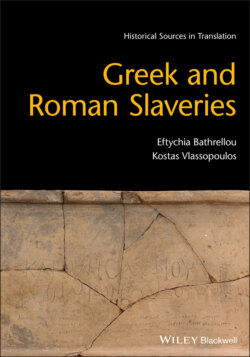Читать книгу Greek and Roman Slaveries - Eftychia Bathrellou - Страница 27
1.16 SEG XL 1044: Greek Funerary Inscription, Gordos, Lydia (69–70 CE)
ОглавлениеThis funerary text uses the language of honorific inscriptions, a common feature of epitaphs from Roman Lydia. All the names recorded are Greek. Because the style is largely elliptical, we have added the assumed words in round brackets, to assist comprehension.
Literature: Martin 2003; Zoumbaki 2005.
In the year 154, on the eighth day of the last third of the month Artemisios.
Elikonis honored Amerimnos, her husband […]; Amerimnos (honored) his father; Terpousa (honored) her own son; his grandmother Nikopolis (honored him); Alexandros and Demetria and Terpousa (honored) their brother; Aigialos, his foster father, (honored him); Gamos (honored) his in-law. All his kinsmen and fellow slaves honored Amerimnos.
Farewell.
What kind of inscription is this?
What kind of community is presented here honoring Amerimnos? What forms of kinship are evident? Cf. 7.12.
Are these people slaves? How can we know?
Is the master of these people mentioned? If not, what are the implications?
What do you think about the use of the vocabulary of honor by this group of slaves?
